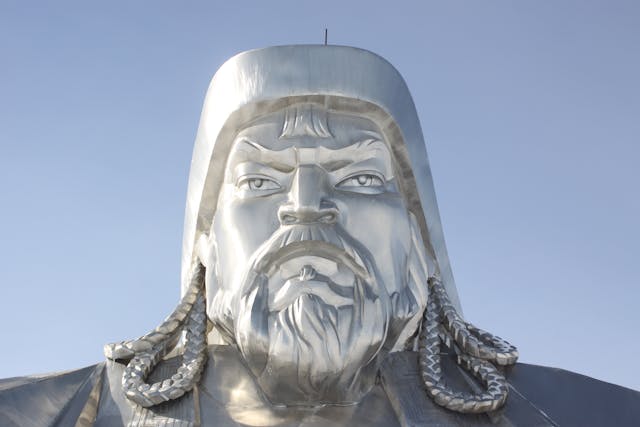
Why was Genghis Khan so effective? Genghis Khan was effective because of his military strategy, but also because he could take advantage of the natural abilities of the Mongols he commanded and of the weaknesses of the enemies he faced.
Genghis Khan was born in 1162. His birth name was Temūjin, and he was the eldest child of the tribal chief of the Brojigin clan, a not overly important clan until Genghis Khan brought them to the forefront of Mongolia. His father died when Genghis was 8 and he and his family were abandoned by the clan. After a lot of setbacks and a pretty hard life, he emerged as a military leader and began to take over all of the other Mongolian clans. By 1206, he was the undisputed leader of the Mongolian steppe, and he officially changed his name to Genghis Khan.
Once he had control of all the Mongolian clans, he turned his attention to China. China was divided into three parts at the time and Genghis Khan started with the part closest to the Mongolian steppe, the Western Xia. He had conquered the whole area by 1215 and headed on. He died in 1227, possibly from an illness, and by his death he had created an empire that stretched from the Caspian Sea in the west to the edge of China above the Korean peninsula. He was succeeded by his son, Ogodei Khan, but it was his grandson Kublai Khan who pushed the Mongolian Empire to its greatest limits. His empire reached from the middle of Europe, through the Middle East, into lower Russia, and down to the bottom of modern China. At its peak, the Mongol Empire was the second largest empire in history, behind only the British Empire. Still, it is undeniable that Kublai Khan wouldn’t have been able to do so much if Genghis Khan hadn’t created an army and a system that Kublai Khan could use. So, why was Genghis Khan so effective?
Genghis Khan was an excellent military tactician. He was able to use his armies very effectively through several methods. The first was strict discipline. This was vital because the nomadic people that lived on the steppe were not used to fighting together. They were more used to roaming in small bands. Genghis Khan had to train them how to fight together and discipline was vital. He also introduced a system that no other army in the world was using. His system was freedom of action. He would outline the overall goal and would then leave it up to the individual commanders to work out how to accomplish it. That sounds obvious by today’s standards, but at the time, commanders controlled every movement that their armies made. The third thing he did was organizing supply lines. A lot of battles are lost because the army takes a town, but then can’t feed itself and has to retreat. Genghis Khan didn’t have this problem.
Genghis Khan was also able to take advantage of the tremendous strengths of the steppe people. The first was that they were extremely hardy. They were used to living outdoors and travelling a lot. They could survive on little food and they knew how to find food when they didn’t have any. They were excellent horsemen and the horses they bred were extremely fast and had a lot of stamina. They were excellent bowmen and the Mongols used a special bow that was short and had a tremendous pull. They could fire a lot of arrows very quickly and very far. They were also adept at firing from the saddle. Also, because they were nomads, they were used to moving from place to place and a military campaign was no different to regular life.
Genghis Khan was also able to use the weaknesses of the people he was attacking against them. The Chinese were divided into different empires and they wouldn’t help each other. They also thought that they were safe behind their city walls and didn’t prepare as much as they should have done. They were also not as skilled on horseback as the Mongols were. Genghis Khan invented a system to psychological warfare that helped him out. He gave all of the cities he attacked a chance to surrender. If they did, straightaway, they would pay him tribute and become vassal states. If they refused, when he breached their walls, as he inevitably did, he would slaughter or take slave every single man, woman, and child in the city. That way, the next city he approached would be far more amenable to surrendering.
Genghis Khan was very interested in conquering and enlarging his empire, but he wasn’t so interested in religion or race. This went strongly in his favor because it meant the peoples he conquered were far more likely to fight for him. He was an equal opportunities employer. And this is what I learned today.
Try these:
Sources
https://en.wikipedia.org/wiki/Genghis_Khan
https://www.iflscience.com/what-made-genghis-khan-so-successful-75126
https://www.thecollector.com/top-mongol-leaders
https://en.wikipedia.org/wiki/Kublai_Khan
https://en.wikipedia.org/wiki/Mongol_bow
https://www.historyextra.com/period/medieval/the-brutal-brilliance-of-genghis-khan
https://en.wikipedia.org/wiki/List_of_largest_empires
Photo by MBVisign: https://www.pexels.com/photo/genghis-khan-statue-in-close-up-photography-6466768/
